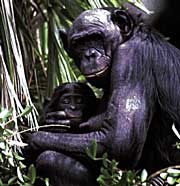Those who are not hunted, die from the Ebola virus * The populations of gorillas and chimpanzees are disappearing at a greater rate than previously thought

Chimpanzees. The population is smaller than 50 percent in the years 2000-1983l
Gorillas and chimpanzees, the most common great apes and closest to the human race, are endangered by hunting and now also by the Ebola virus. The situation is so serious that researchers are calling to declare that they are in "severe danger of extinction".
The scientists, who come from a wide range of institutes and conservation organizations, published a report on Tuesday in which they determined that the population of great apes in Gabon and the Congo, home to 80% of the gorilla population and most of the chimpanzees, was smaller than 50% in the years 2000-1983. According to them, at this rate populations will decrease The gorillas and chimpanzees in 80% in 33 years (a globe and a half) - and according to the criteria of the World Nature Conservation Organization, this justifies a change in the definition of the danger to which they are subjected.
According to Dr. Peter Walsh of Princeton University, the lead author of the report, the situation could be even worse because the rate of decline of great ape populations is increasing.
The report was published in the online edition of the magazine "Nature" From the summary of the findings, published together with the report, it can be concluded that within a decade only isolated pockets of these great ape populations will remain.
Walsh emailed the report's findings to people involved in wildlife conservation and great ape research in Africa. In his messages, which were also sent to journalists, he criticized the futile struggles and the lack of openness to the issue among scientists: "We failed in our attempt to protect the African monkeys," he wrote, "we failed to protect them from Ebola and from illegal hunting. Eventually they will become extinct and this will happen much sooner than many of you expect. If we don't take extreme measures, the gorillas and chimpanzees will disappear from equatorial Africa within 10 years." In a telephone interview Walsh added: "In 20-10 years they will say - what did these researchers do? They knew it was going to happen and did nothing. I don't intend to be one of those researchers."
Dr. Russell Mittermeier, president of the International Organization for Conservation of Nature and chairman of the Great Ape Group within the World Union for Conservation of Nature, which is responsible for listing endangered animals, said, "There is no doubt that we are facing a serious crisis." Mittermeier, who is not one of the authors of the report, believes that the union will act according to the report's recommendations and change the status of gorillas and chimpanzees accordingly. "I don't think they will become 100% extinct. We might be able to save remnants of the population. But instead of being a significant component of the landscape of Central Africa, they will only be scattered segments," he said.
Dr. William Karsh, a veterinarian from the Wildlife Conservation Society who studied Ebola in central Africa, called the condition of the great apes "bleak." According to him, the Ebola virus poses a bigger problem than hunting, mainly because researchers do not know which animals are its carriers. "It's a disease that's always in the forest, but we don't know where," he said.
Not everyone agrees with the report's conclusions. Dr. John Oates, an anthropologist from Hunter College in New York, who has studied the great apes in Africa, claims that he is very disturbed by the possibility of the extinction of gorillas and chimpanzees in Central Africa, but is not convinced that the report's data is accurate. According to him, he felt uncomfortable dealing with gorillas and chimpanzees as if they were one piece, because "chimpanzees can be found all the way from Senegal to Tanzania."
Conservation experts agree that one of the best ways to save the great apes is to increase the enforcement of laws prohibiting hunting, at the same time as putting pressure on international companies that cut down trees in the apes' habitats. Walsh called for other actions to be taken. Among other things, he suggested setting up a panel that would characterize the Ebola epidemic and suggest ways of dealing with it. According to him, he would like to see research works that would focus on the development of a vaccine for animals.
For news on the subject at the BBC
